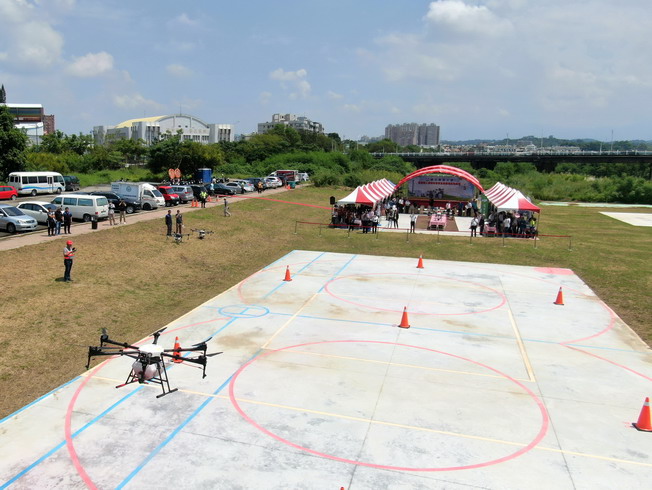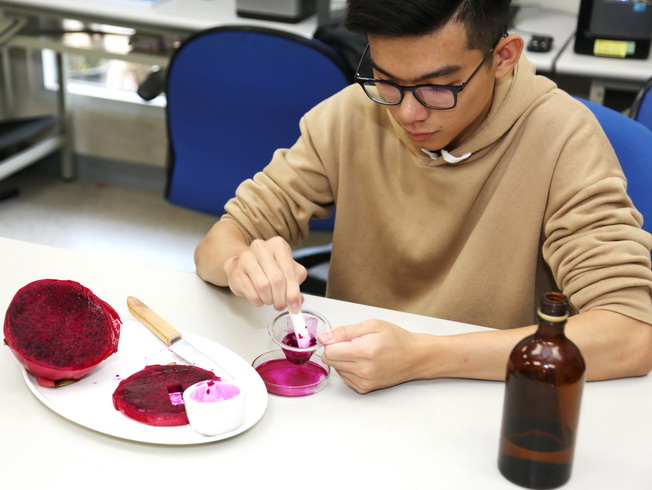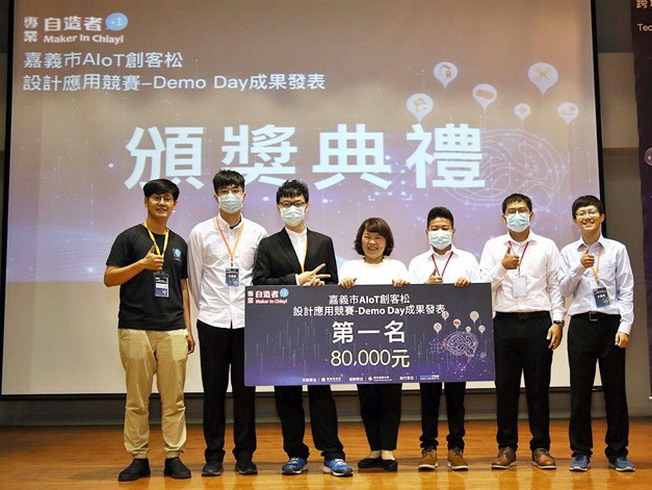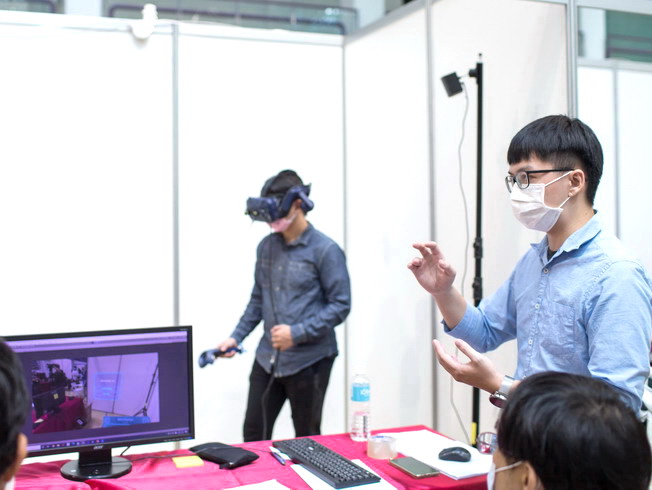 The NCYU College of Science and Engineering features basic science and applied science, and consists of eight departments: Electrophysics, Applied Chemistry, Applied Mathematics, Computer Science and Information Engineering, Biomechatronic Engineering, Civil and Water Resources Engineering, Electrical Engineering, and Mechanical and Energy Engineering. In addition to basic research and abundant research and development in line with the technological trend, the departments of the college, benefiting from NCYU’s agricultural technology and biotechnology expertise, work together to form an interdisciplinary research team. By demonstrating remarkable expertise in science and engineering, they dedicate themselves to facilitating the development of biology and agriculture-related technology. They hope to cultivate professionals for Taiwan’s high-tech intelligent industry by evolving agricultural production technology with smart technology with the times.
The NCYU College of Science and Engineering features basic science and applied science, and consists of eight departments: Electrophysics, Applied Chemistry, Applied Mathematics, Computer Science and Information Engineering, Biomechatronic Engineering, Civil and Water Resources Engineering, Electrical Engineering, and Mechanical and Energy Engineering. In addition to basic research and abundant research and development in line with the technological trend, the departments of the college, benefiting from NCYU’s agricultural technology and biotechnology expertise, work together to form an interdisciplinary research team. By demonstrating remarkable expertise in science and engineering, they dedicate themselves to facilitating the development of biology and agriculture-related technology. They hope to cultivate professionals for Taiwan’s high-tech intelligent industry by evolving agricultural production technology with smart technology with the times.
Department of Electrophysics
The educational goal of the Department of Electrophysics is to provide students with a solid foundation in physics and electronics-related training. It is devoted to professional research and curriculum planning with special focus on “optical science” and “semiconductor electronics. ” In addition to solid training in basic physical science, it pays attention to students’ practical experience in laboratory projects, practical skills and the ability to analyze theoretical problems. After graduation, the students may join the workforce in such industries as electronics, semiconductors and optoelectronic technology. They may also complete credits in pre-service education courses of physics teachers in the categories of national elementary or secondary schools during college, and serve as physics teachers in elementary, junior or senior high schools after graduation. As green energy technology is key to the country’s industrial upgrading, and an indicator for future economic development, the department contributes to featured research projects on green technology with special focus on light-emitting diodes and solar cells. The department co-founded the green energy program with the Department of Mechanical and Energy Engineering. The program introduces students to the latest technological developments with a view to matching skills and training with industry needs, thus enhancing students’ competitiveness in the job market.
Department of Applied Chemistry
The Department of Applied Chemistry aims to provide students with sufficient knowledge in chemistry through courses on basic chemistry and practical techniques. By providing abundant educational and industrial resources, they hope to enhance students’ independent thinking, professional skills and interdisciplinary competence via a wide variety of courses and experiments. After graduation, the students may pursue a career in the industries of materials, optoelectronic semiconductors, analysis and testing and pharmaceuticals. They may also teach at secondary schools or universities. Professional studies are centered on chemistry, encompassing latest trends in contemporary technology and industrial development with emphasis on the synthesis, analysis, sensing and characteristics of materials, biology, medicine, agriculture, energy and related substances. To reduce the education-job mismatch, in addition to diversification of courses, the department also invites experts with years of practical experience from relevant industries to share their experience and current development of industrial application technology.
The faculty is committed to research ranging from medical and agricultural drug synthesis, material synthesis, analytical chemistry to biochemistry. After numerous experiments, Prof. Ming-Der Su from the department successfully found a special catalyst containing Si atoms, which can effectively and selectively break a certain chemical bond. The chemist believes that if a chemical bond can be broken and rejoined other chemical bonds to make the desired chemical molecule at will, it can be adopted to mass-produce substances of synthetic chemistry or pharmaceutical chemistry required for consumer products. It can even help solve issues such as environmental pollution and climate change. Associate Prof. Jiann-Jyh Huang conducts studies on novel metal-catalyzed tandem reactions, which can be used to synthesize various tetracyclic heterocycles, as precursors for the development of new targeted anti-cancer drugs. The research results were published in international journals.
Department of Applied Mathematics
In addition to teaching, research and practical applications in basic mathematics for science, the Department of Applied Mathematics characterizes itself from the mathematics departments of other public and private universities in Taiwan by integrating three teaching and research teams: computing science, information science, and probability statistics. Together, they contribute to comprehensive development in teaching, research, design and manufacturing, and help facilitate technology transfer and industrial technology cooperation with interdisciplinary technology integration and research and development. The applied research covers micro-nano computing simulation, cloud computing, dynamic system simulation, scientific calculation and modeling, information digital content, artificial intelligence and applied information software components, biostatistics, industrial statistics, quality control, popular mathematics, data science, etc. After graduation, the students may seek jobs in design and development of mathematics or information software (teaching aids), biotechnology, industrial design, financial analysis, quality control, insurance actuarial, and mathematics education, among others. The students may also pursue further studies by applying to graduate programs in applied mathematics, information engineering, statistics, finance, industrial engineering and mathematics education.
Department of Computer Science and Information Engineering
As a high-growth industry, information engineering is a core development goal worldwide. In the coming decades, information professionals will remain in short supply. The main development goals consist of three major domains: software engineering and knowledge engineering, interactive multimedia, and network and information security. It involves the integration and application of technological innovations such as artificial intelligence, Internet of Things, information security, knowledge engineering and software engineering. The department is devoted to enhancing interdisciplinary cooperation between smart agriculture and information technology, complete with key research areas such as NCYU’s agricultural technology or life sciences. Some examples include: developing precise environmental control of Phalaenopsis and intelligent detection systems for fertilizer irrigation and quality grading, estimating milk production of dairy cows with deep learning and applying image information for classification and categorization of Aiwen mangoes, evaluating under-forest beekeeping resources in the experimental forest farm and developing the anti-theft and warning system for bee farms, carrying out automatic identification of chicken distribution using object detection and grouping technology, etc. All these bear witness to the dazzling research results in the development of smart agriculture.
The domestic industry in Taiwan not only focuses on semiconductor and IC design, but smart software and communication systems, which include, for instance, cloud, smart mobile devices, (wearable) Internet, robots, interactive bionic systems, and bioinformatics (integration) systems. The department aims to equip students with relevant high-level skills, who may join the workforce in relevant industries, or seek high-paying positions as system (integration) engineering project managers in the future. The NCYU students continue to win awards at creative design competitions related to digital games and other software. In 2020, they won the first place at the 25th International ICT Innovative Services Awards (InnoServe Awards) in the category of AR/VR Innovation Application. The students also won the third place at the 2020 Intelligent Innovation and Interdisciplinary Creation Contest in the category of somatosensory interactive technology, and an honorable mention at the MOE Online Presentation and Software Competition of Smart Innovation Interdisciplinary Talent Cultivation Alliance Project. They have cooperated with many domestic manufacturers and demonstrated remarkable results in research and development on interactive multimedia and cloud computing .
Department of Biomechatronic Engineering
The Department of Biomechatronic Engineering is an interdisciplinary department integrating machinery, electromechanics and control. There are three major objectives in teaching and research development: power mechanical engineering, system sensing and control engineering, and biomaterials and biomedical engineering. The Electromechanical professional program and biomechanical practice program are offered for students to choose from according to their interests. The objective is to nurture professional knowledge in theory and practice of mechanics, electronic control, and electromechanical integration, so that the students may contribute their knowledge for technological advancement in terms of power system design, electromechanical system design and manufacturing, automation control, bioengineering and smart agriculture. The department is expected to cultivate talents for the future development of biotechnology and agricultural science and technology in the country. After graduation, the students may work in information, electronics and other high-tech industries (e. g. TSMC or Innolux), traditional industries (e. g. China Steel or CPC Corporation), automation companies, environmental control, biotechnology companies, etc. The students who complete courses offered by the teacher training programs (for secondary education in biomechatronics) during college may serve as teachers in national elementary, junior or senior high schools in the future. They may also pursue jobs in the public sector.
Advised by Prof. Huaang-Youh Hurng and Associate Prof. Huang Wei-Jen from the department, the student team was awarded the first prize at the AioT Makerathon Design Contest by the Chiayi City Government with their “Sweet Pepper Garden Output Estimation System with UAV Aerial Photography,” They were singled out among the 35 teams from ten colleges and universities and two startup companies in Taiwan. The achievement showcased the joint efforts of teachers and students, and their distinguished research and development results in smart agriculture. To enhance agricultural competitiveness, the faculty of the department has been conducting the training program for pesticide spray technicians, and the technical training and examination program for pesticide spray technicians since 2019, respectively commissioned by the Taiwan Agricultural Chemicals and Toxic Substances Research Institute (TACTRI), and the Bureau of Animal and Plant Health Inspection and Quarantine (BAPHIQ), Council of Agriculture, Executive Yuan. Since 2020, they have been providing courses on technical training related to agricultural drones for the Civil Aviation Administration (CAA). Courses are arranged on technical training related to agricultural drones commissioned by the Civil Aviation Administration (CAA). In August of 2020, the first fixed remote control drone license testing and training ground in Taiwan was established on the west side of Chun-Huei Bridge, Chiayi City, to allow the students interested to learn drone operation and obtain a license in a nearby place.
Department of Civil and Water Resources Engineering
The Department of Civil and Water Resources Engineering is committed to teaching, research and achievement promotion in the two core domains of “civil engineering” and “water resources engineering,” with special focus on irrigation and drainage, water and soil resource conservation, disaster prevention technology, seismic structural prevention, construction materials, public engineering research, and river and sea hydraulic engineering. Its featured research includes environmental and resource conservation research, civil and land disaster simulation calculations, water and sea technology and disaster prevention engineering, green construction and structural repair research, hydrogeological disaster simulation research, and smart irrigation research. The goal is to cultivate professionals who have a global perspective and meet the demands of local industries. In response to the needs of national public engineering construction and social development, they hope to enhance the sustainable use of land and water resources, national economic development and the public’s well-being. Graduates of this department may take the Civil Service Senior and Junior Examinations in such fields as civil engineering, water conservancy, and soil and water conservation engineering. The passing rates have been growing over the years. They may take technician licensing examinations in the categories of structure, civil engineering, water conservancy, soil and water conservation, surveying, earth, etc. The students may seek jobs in planning, design, and research and development related to the development and construction of civil and water conservancy projects.
Department of Electrical Engineering
The Department of Electrical Engineering is committed to cultivating talents in mid- to high-level electrical technology to meet the demands of national construction and industrial development. In addition to theoretical discussion, they embrace an educational philosophy that emphasizes the practical ability with a view to cultivating high-tech electric motor professionals with a solid foundation in motor and practical competency. The course design includes all the basic theories of electrical engineering required in the undergraduate level. Elective professional programs in electronics and system design, communication and signal processing, and computer and control system are offered to equip students with solid basic knowledge to prepare them for further studies and employment. In the future, they may seek jobs in such fields as integrated circuit manufacturing, information communication industry, IC design and testing, and biochip research and development at companies in science parks around Taiwan.
The faculty boasts expertise in two major fields: electronics and systems. They are exceptional scholars with rich experience in teaching, research and practice. Prof. Hsieh Chi-Wen specializes in the front-end research and development of ultra-fine structure pixel detectors, imaging research of new ultra-high radiation FLASH dose, fast signal acquisition and imaging, and new algorithm imaging, among others. He joins the integrated team of the proton therapy quality assurance detector chaired by Prof. Chen Ei-Fong from the Department of Physics of National Central University. They successfully developed the proton detector, which can provide proton beam or photon beam clinical quality assurance so that it will be available for use or sale. The technology was awarded the National Innovation Award in the Clinical Research Category in 2015, and the National Innovation Award Renewal Award in 2019. The energy has become a controversial issue in recent years. While being a relatively clean energy source, nuclear energy has been raising safety concerns since the Fukushima nuclear disaster. Thermal power generation has been criticized for PM2. 5 emissions, which are detrimental to human health. Despite the fact that solar power is a green energy, heavy metal releases from the solar panels are posing environmental issues. Prof. Chiang Cheng-Ta advised students to use dragon fruit instead of synthetic dyes to make dye-sensitized solar cells. The research results have been published in the international journal, making it possible to reduce the environmental pollution caused by solar panel production.
Department of Mechanical and Energy Engineering
Machinery is key to the industrial world. In conjunction with the overall economic development, the machinery industry in Taiwan, which is proud to have a mature technology of CNC machine tools, is dedicated to creating high added values through precision machinery and precision process equipment development. Professionals in precision machinery and system integration are in demand. The department is devoted to nurturing skills in developing mechanical energy-saving systems, and applying energy-saving technologies to the design and manufacturing of precision machinery and energy systems. Located between the Chiayi Dapumei Precision Machinery Park and Tainan Science Park, NCYU is a great place for the development of precision machinery and precision process equipment. To meet the needs of regional industries, a cross-faculty teaching and research team was formed to conduct mechanics studies from the perspective of energy.
Technology, high or low, is key to food, clothing, living, transportation, education and recreation in our everyday life. It can only be realized with machinery, which needs energy to work. After graduation, students of the department may join the workforce in the existing machinery industries (machine tools, process production line and vehicle) and other machinery-related industries, energy industries (hydropower, thermal power and nuclear power), or even the emerging green energy industries (photovoltaic, energy-saving technology, biomass fuels, hydrogen and fuel cells, electric vehicles, wind power generation, and the tidal power generation of the next era). They may also take the Civil Service Senior and Junior Examinations, Senior and Junior Qualification Examination for Professional and Technical Personnel, or the examination for state-owned enterprises. In other words, the students enjoy the opportunity to explore their prospective career paths.
   |